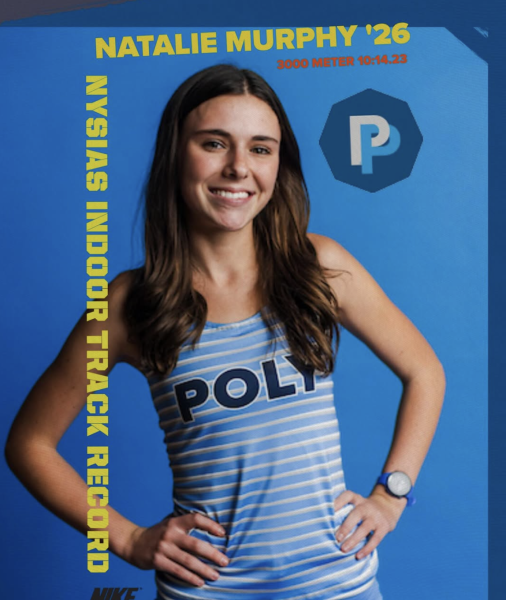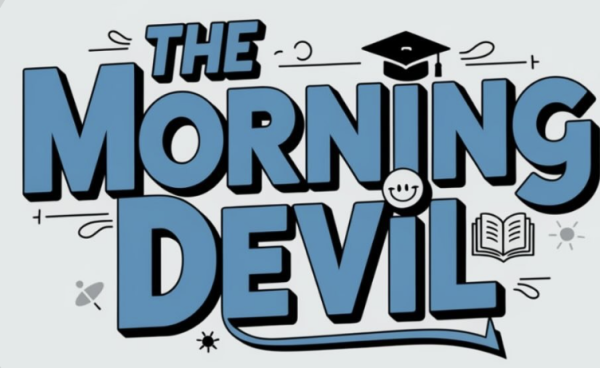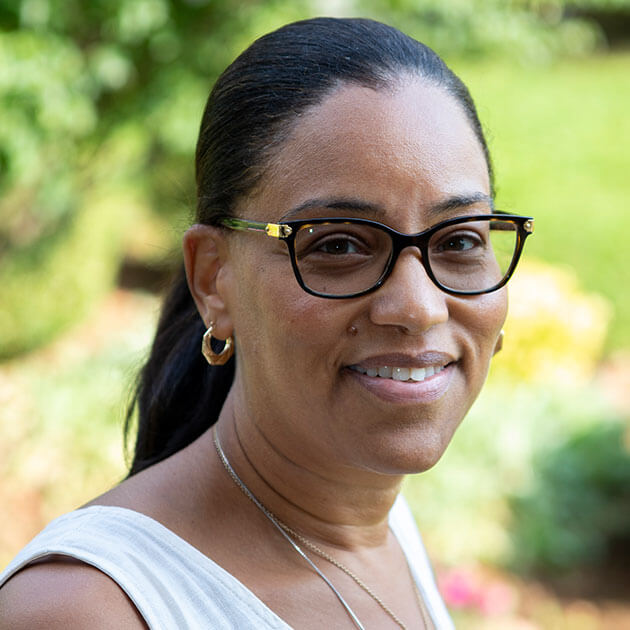Finding a Balance
Erika Freeman, a high school biology teacher and mother of 4, learning how to find the balance between her two worlds.
Finding a Balance
An excerpt of this profile was originally published in the February issue of The Polygon.
It’s 3:40 on a Wednesday afternoon at Poly Prep and there are still 3 students in lab 4 of the science building. Microscopes are out and the students are making sketches of plant cells on their assigned worksheets. Mrs. Erika Freeman sits at the table next to them, answering questions, all while speaking to a student from another class about a different assignment. Looking in at this classroom, one would think that the room was at its full capacity, especially this far along after school hours. Then in come four more people, smaller than the ones already taking up the room. Multiple mini Freemans walk one by one into the office right next door. Their laughter and bubbly energy after a long day at the Poly Prep lower and middle schools is slowly calming down now that they have returned to their temporary home after school: their mother’s classroom.
Erika Freeman was born into a family of teachers. Her mother, grandmother, stepmother, and even cousins are involved with education, so it’s no surprise that Freeman is the accomplished teacher that she is today. Her educational life first began with her enrollment to Horace Mann from nursery school all the way up to 8th grade. From there she transferred over to one of New York’s specialized public high schools, Bronx Science. At this point, 13-year-old Freeman had very few ideas as to what she wanted to do with her career. “I thought I wanted to be like my uncle,” said Freeman, an engineer who has always been very similar to Freeman herself. With their similar ways of thinking, growing up Freeman thought this was where her life was headed. Little did she know, during her senior year at Wesleyan college she would teach her first biology demo lesson at Poly Prep, ultimately changing the course of her life forever.
It’s late in the 1990s and the first time Freeman would be addressing a full class all on her own. Her outfit, which had been picked out the night before, looked exactly how she had imagined it. Inside room 216 of the Poly Prep main building sat the class that she was about to teach. All of their 10th-grade eyes focused on her, along with the eyes of many important figures at the school; the dean of faculty, chair of science, and the teacher of the class. To Freeman, the lesson came naturally and within no time there was rapid engagement and admiring stares. But little did she know she was teaching the students the wrong thing.
Quickly fixing the miscalculation on the board, Freeman feared it was too late and that she had lost her first chance at a job by inaccurately teaching the material. However, this mistake is what she continues to think led her to receive her job as the, “correction was better than the thing [I] she was trying to do.” It was not the actual mistake that was important, as she cannot even remember what exactly it was, but the importance was in its correction. Freeman learned that sometimes owning a mistake and fixing it is more important than being one hundred percent correct all the time. Looking back, she is, “glad I caught my mistake because I don’t think I would have gotten the job if I had let the mistake go.”
Even after she was hired, Freeman’s life wasn’t what she had planned it out to be. With dreams of going to med school and becoming a nurse, teaching at Poly Prep was just a way to fill a gap between what she thought she wanted to do. The AAUW remarks that, “About one-in-five working parents… have turned down a promotion because they were balancing work and parenting responsibilities.” Similar to Freeman, who even though she is happy with her life as a teacher, had an opportunity to pursue a different path. However, things did not play out this way because when she arrived at Poly she met her husband: Khari Freeman, former English teacher, and wrestling coach. They worked together at the school for 4 years and after that, there was no way that Freeman would leave. Looking back on her life, she freely admits that, “I wouldn’t change teaching here,” but someday she might still choose to pursue a medical path and become a nurse. Freeman clearly has strong aspirations and even with everything she is doing now, there is still that search and wonder for more.
From the moment Freeman met her husband at Poly, family had become a big part of her work life. All four of their children; Khari, Kaya, Kiana, and Krystal, attend Poly Prep, throughout the lower, middle, and upper schools, allowing them to always stop by their mother’s classroom after school. — Where at 4:00 pm there are still students working. At this time, school had ended fifteen minutes ago and her daughter’s voices in the office next door were slowly rising. Their patience wouldn’t last forever. Khari Freeman, sophomore, the oldest and only son of the Freeman household walks in, surrounded by the laughter of 3 or 4 friends. Freeman embraces her son and gives him a quick kiss, the interaction they have every day before he heads off to lacrosse practice. The sound of the door shutting behind him resonates throughout the room, as the students continue to work on their lab and other various activities.
When little footsteps approach, Krystal appears next to her mother. She hands her a large book and a stuffed animal. Freeman has only enough time to glance at her and say “Thank you” before refocusing her attention on the student in front of her. When asked about when it becomes hard to maintain that balance the answer was simply, “You just saw it.” Explaining this experience to her student she says, “it’s a tension for time and a battle for priority at the moment.” Freeman can recognize the difficulty in maintaining work aspects of her life and family aspects, especially since they are so closely connected. After school it’s a constant collision of: should she be watching her kids, or should she be paying attention to her students?
Even outside of school this issue is quite prevalent. “During school breaks I have to create family time… [then]I am only mom, I’m not Mrs Freeman,” she says, all while looking down at the stuffed animal in her hands. Her arm reaches out for Krystal and finds that she’s already gone. Her work continues on. “When I’m at work, work is my priority,” said Freeman.
Throughout all of the struggles, Freeman continues to be a very admirable teacher and role model at Poly Prep. Current sophomore, William Ling-Regan remarks on how “she’s really passionate about biology and inspires us to have that same passion that she does.” These accomplishments were acknowledged when she won the Poly Spirit Award in 2018. This award is one that Poly presents to one faculty member a year, who demonstrates the values and spirit that the school wishes to represent and encourage within its institution and its students. Looking back on this moment, Freeman begins to well up, and her eyes shine with clear gratitude and astonishment at the way the school recognized her. Freeman notes that, “the people who’ve won it before me are people who I’ve learned to teach from,” making the award a very humbling experience. Colleagues, former students, and family all gathered to enjoy a beautiful meal and ceremony dedicated to Freeman and everything she had accomplished. In another study by the AAUW, they found that, “23 percent of working parents say they’ve been treated as if they aren’t committed to their work because they have kids.” Clearly, with Freeman, this is not the case as this award demonstrated and acknowledged people’s view of her and her work, with the highest respect. Freeman’s son, Khari makes it abundantly clear that his mother is deserving of this award. “She’s just great,” he says. Meanwhile, the qualities of a spirit award winner are still evident within the ways that Freeman teaches to this day.
When thinking of Freeman, the word, “passion” is one that can most accurately sum her up. Whether it be for her students, her children, her colleagues, or biology itself, Freeman is passionate about whoever she is helping and whatever she is doing. However, it can still be hard to maintain a balance between family and work. For now, Freeman continues to create a family both within her classroom and at home. Throughout her life, things didn’t always go to plan, but through hard work and dedication, Freeman has found her way around many of the things standing in between her career and her family. Many experiences ultimately shaped the course of her life in order to reach where she is now. Meanwhile, her accomplishments continue to grow despite the struggles of maintaining a good work-life balance.

Jess Dosik is the current Co-Editor-in-Chief of the Polygon and she is currently a senior. She began her career on the Polygon in her freshman year as...



























